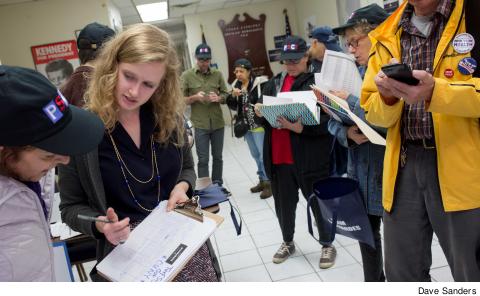More member participation for 2020
 |
As the labor movement gets ready for the 2020 presidential election effort, the American Federation of Teachers (AFT) has revamped its endorsement process to allow for more member participation and input, a move AFL-CIO President Richard Trumka hailed as putting “the power exactly where it should be – in the hands of the members.”
The AFT announced this spring that the new endorsement process will have increased member engagement (including the use of town halls and Facebook Live), direct engagement with candidates for AFT members (having candidates come to workplaces and meet with members face-to-face) and give affiliates and local members access to the candidates and their campaigns well before the endorsement date. The resolution encourages AFT members to run as Democratic convention delegates for their preferred candidates, sources said.
MEETING MEMBERS
Central to this new process is every Democratic presidential candidate to “walk in the shoes” of AFT members. PSC President Barbara Bowen said, “We are working to get some of them to walk in the shoes of PSC members,” noting that the plight of adjuncts nationwide has been recently written about in the mainstream press, including the Atlantic and the New York Daily News. The candidates are, indeed, competing for teacher votes. Vermont Senator and presidential candidate Bernie Sanders recently met with K-12 teachers in Ohio. The AFT also praised California Senator and presidential candidate Kamala Harris for her support for raising teacher pay.
In announcing the changes, AFT President Randi Weingarten said in a message to members, “We must elect a president who believes in livable wages; public education; higher education; healthcare as a right, not a privilege… And, we must have a process that our members believe in, that is credible, authentic and transparent.”
Weingarten also said members interested in the presidential endorsement process should look at aftvotes.org/.
“The AFT and a number of other major unions – CWA and SEIU, for instance – have signaled that they will not endorse any presidential candidate early. Instead, they’ll encourage individual members or local and state affiliates to develop independent relationships with candidates’ campaigns,” said Geoff Kurtz, a Borough of Manhattan Community College political scientist, who also serves as the campus’s PSC chapter chair.
The Democratic primary field is a crowded one, numbering 21 candidates at press time. To date none of the candidates have spoken to the issue of adjunct pay. A few candidates have pointed to austerity in higher education and have promoted ideas for free college and student-loan forgiveness. Clearly, accessibility of higher education is very much on the minds of presidential voters. The question of investment in and quality of public higher education must be pressed during encounters with presidential candidates by union members.
Kurtz, who is active in the PSC’s political action work, sees this work as offering a big opportunity for unions like the AFT and its affiliates. The PSC, for example, used its muscle to help win key State Senate races to flip it to the Democrats. The union helped to flip a US congressional seat in Staten Island to the Democratic candidate Max Rose, whose mother is a BMCC professor.
THE PSC ROLE
It’s time, PSC political activists said, to harness that power in the race for the White House. “In the next year we will begin to see a narrowing of the field of presidential candidates. It is incumbent that the PSC play a role in advancing a candidate who is most likely to create policies that invest in both access to and the quality of public higher education,” said Mike Fabricant, the union’s legislative chair.
“Unions are not strong enough to pick a winner, to play kingmaker, within a major party’s presidential primaries,” Kurtz said. “But they are strong enough and savvy enough that quite a few Democratic candidates want to compete for their support. The AFT’s approach this year is a creative and pragmatic way of leveraging the union’s modest strength. Let the candidates compete. We’ll see how pro-union they become as they do so.”

